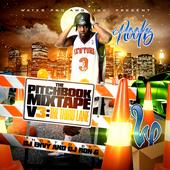In 1978, New York City trains moved through the 5 boroughs splashed with colors and letters of artists that snuck into the train yards to put their names on what would become their moving art galleries. DJs scratched records at house parties ,and in parks while ghetto kids moved with the music inventing something the world had never seen with each windmill and head spin. The master of
ceremonies hyped the party with his rhythm and poetry, and Hip Hop as a baby was being nurtured into the "city that never sleeps". Brooklyn born and Harlem bred emcee Hooks Diesel, born Dorian Manson, was completely submerged into this flavorful and vivacious culture from its very inception. For many of the youth in New York, Hip-Hop instantly became a essential role in their everyday lives. Harlem was his home and the realities of poverty and oppression were as evident as the cracks in the pavement. As a young boy in the 1980's, the streets were polluted with a new drug called crack cocaine, at a time when President Reagan's " Trickle Down Economics" never seemed to trickle down far enough. He would be shaped by the tough and violent neighborhoods with so much beauty but with so many blemishes as well.
Harlem is often considered the epicenter for African American culture in America. Black intellectuals of the Harlem Renaissance such as Marcus Garvey and W.E.B.DuBois, writers such as Langston Hughes and Zora Neale Hurston, and incredible jazz musicians like Louis Armstrong and
Billie Holiday made Harlemites proud. Dorian, who also goes by the moniker Hooker Dot, was also heavily influenced by this rich history of his home. Perhaps nowhere else in the world could there be such a clashing of historic creativity and epidemic crime. The streets held scores of people trying to make their way by selling drugs while countless others fell victim to the plague of poverty and drug abuse. Dorian's family was no exception in either case. He says, "That is something that is just part of the struggle that we went through." Dorian's mother was a religious woman and tried to protect him from the madness in the streets around him. She brought a sense of faith and belief in God. Dorian would go on to play the Congo drums at church, which he claims later influenced his rhyme style. "Even to this day, when I flow I place
my words to the rhythm like I am beating the drum ".
As Dorian got older rapping became his expression, his passion, and his way to put his world into words. He was given the name "Hooks" because he had a penchant for always coming up with the hooks to songs that he did with his crew. He follows in the tradition of influential Harlem emcees such as Big L, Mase, and Black Rob to name a
few. Hooks has done shows with Murder Inc, Mr.Vegas and Cappadonna. He has performed at the Source Magazine Youth Foundation in Maryland, and done shows in Boston, New York, Rhode Island and Washington DC. He's been involved in various projects with major record labels such as Electra and Bad Boy Entertainment. He also made a cameo
appearance rapping in the independent film "Annie B.
Real," which was featured on HBO.
Nowadays it seems like everywhere you go
you hear somebody rapping. Hip Hop culture has grown
to have such an influence on the youth of America.
It has offered expression and opportunity never
imagined in the minds of the kids scratching
records, break dancing, and painting the trains back
in the 70s. Somehow you have to think that had they
known what they had created would live on through
generations, they would have wanted someone like
Dorian "Hooks" Manson carrying on their legacy.
Download Mixtape | Provided by DatPiff.com
Download Mixtape | Provided by DatPiff.com
